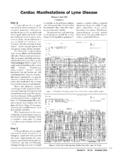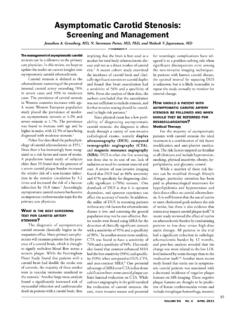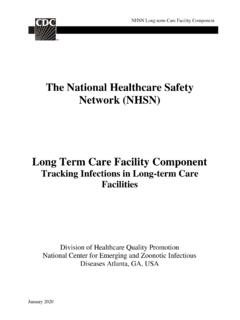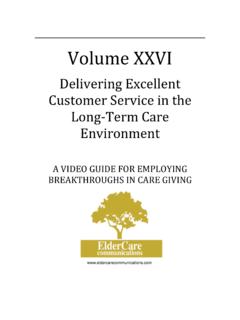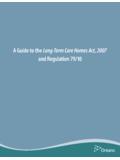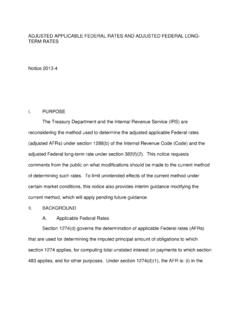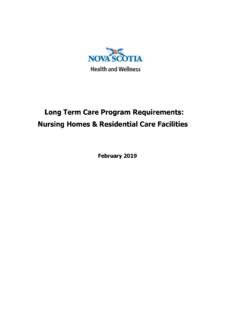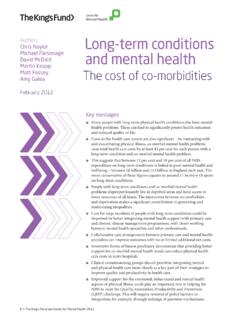Transcription of The Use of Antipsychotic Medication In Long Term Care
1 The Use of Antipsychotic Medication In long Term Care . Gary Epstein-Lubow, MD, and Andrew Rosenzweig, MD, MPH. This brief review frames the historical routine monitoring for side effects; consid- In Massachusetts, the Department of context surrounding Antipsychotic medi- eration of concurrent behavioral treatment; Public Health has convened an Antipsy- cation for patients in nursing homes and and, at least one attempt every six months chotic Task Force to raise awareness about other long -term care settings. The infor- to reduce the dose of Antipsychotic (or docu- Antipsychotic use, including possible educa- mation is meant to describe, concisely, the mentation of a rationale for no dose reduc- tion campaigns and direct interaction with evidence for and against the use of antip- tion).3 nursing home clinicians and administrators. sychotic treatment. Every patient's expe- Soon after OBRA, serial introduction long -term care facilities are likely to welcome rience is distinctive, and each treatment- of second generation antipsychotics started.
2 Such activities because the new GDR guide- decision has potential benefits and risks. Early interest in these medications may have lines carry devastating penalties for non-com- The first Antipsychotic Medication led to increased use in nursing The pliance. For example, F-Tags are regulations approved for use in the United States was original interest in the second generation within the state operations manual; they are chlorpromazine. In the 1950s, the use of antipsychotics for use in the elderly may have written by the Centers for Medicare and chlorpromazine allowed for been driven by beliefs regarding reduced Medicaid Services. The F-Tags set guidelines deinstitutionalization of millions of resi- risk for parkinsonism, though most of these for prescribing clinicians, pharmacists, nurs- dents from psychiatric hospitals. In the medications can impair gait and mobility. ing homes and state surveyors. F-Tag 329. ensuing five decades, antipsychotics in the An estimated 25% of nursing home resi- applies to unnecessary psychotropic medi- first generation with chlorpromazine dents in the United States receive at least one cations.
3 The goals of F-Tag 329 are to en- and the second generation, beginning Antipsychotic Medication in a given sure that 1) medications are clinically re- with clozapine, have been in and out of Though much of this use is for off-label in- quired to treat a condition; 2) behavioral or favor for patients in long -term care. dications, the vast majority of Antipsychotic other non- Medication measures are used; 3). treatment is for evidence-based Medication use is in an effort to promote the Antipsychotic Medication AND Nevertheless, the Antipsychotic prescribing highest well-being; 4) actual or potential NURSING HOME REFORM rate in nursing homes5 and the relationship negative outcomes are avoided; and,5) all In 1987, the Omnibus Budget Rec- between the use of antipsychotics and mor- negative outcomes are promptly identified onciliation Act (OBRA) incorporated tality8 remain concerns. and treated. If GDRs are not conducted nursing home reforms. OBRA required according to the rules, the nursing home all nursing home residents to participate REGIONAL ATTENTION TO THE USE must undergo a cumbersome follow-up: a in a national database originally defined OF ANTIPSYCHOTICS IN long level 4 deficiency (immediate jeopardy) re- by the Resident Assessment Instrument, TERM CARE sults if there is failure to monitor or reduce today known as the Minimum Data Set The January 2007 iteration of OBRA the dose of an Antipsychotic in the presence (MDS).
4 The Resident Assessment Instru- recommends Gradual Dose Reduction of a side effect such as worsening gait and ment led to significant improvement in (GDR) of all Antipsychotic medications in mobility due to parkinsonism, or if there is a care plan documentation, greater use of nursing homes. For patients newly admit- failure to do a non-contraindicated GDR in advanced directives and better behavioral ted and receiving an Antipsychotic medica- the context of a significant negative drug ef- treatments for problem such as bowel in- tion, or established patients who begin an fect such as tardive dyskinesia. continence, while reducing problematic Antipsychotic Medication , during the first practices such as physical restraints and in- year of treatment staff must document at SAFETY AND EFFICACY OF. dwelling urinary least two attempts to reduce the medica- Antipsychotic Medication USE. OBRA led to increased monitoring of tion, with at least one month between the FOR ELDERLY INDIVIDUALS.
5 Antipsychotic Medication in nursing homes, attempts. If the Antipsychotic Medication The OBRA legislation occurred 15. but it is not clear whether overall usage de- continues beyond the first year, staff must years before the US Food and Drug Ad- clined2 or remained stable1 during the early attempt one GDR every year unless clini- ministration (FDA) began generalized 1990s. For patients receiving Antipsychotic cally contraindicated. Documentation that warnings regarding elderly patients' use of Medication , the OBRA regulations man- a GDR is clinically contraindicated must Antipsychotic Medication . In the years date that all nursing homes report the fol- include 1) notation that target symptoms following OBRA, use of first generation lowing: an appropriate diagnosis for use of worsened during the most-recent GDR antipsychotics declined; by 2004, prescrip- an Antipsychotic Medication , including spe- attempt in the current facility along with tions for second generation Antipsychotic cific target symptoms along with change 2) the physician's current medical opinion medications in nursing homes outnum- in these symptoms over time; administra- as to why additional attempts at GDR are bered first generation use 10 to A con- tion of the Medication within a recom- likely to impair the patient's functioning or siderable portion of this Antipsychotic mended 24-hour dosage limit along with worsen the target symptoms.
6 Treatment is for behavioral disturbances 372. MEDICINE & HEALTH /RHODE ISLAND. associated with dementia.; there has been label use, Antipsychotic Medication is rea- moderate empirical support for this prac- The January 2007 sonable for psychotic symptoms that occur tice since the early 1990s9 with declining iteration of OBRA in isolation (such as in delusional disorder). interest regarding these medications in the or in the context of other conditions such context of documented adverse events. recommends as delirium, Parkinson's disease, psychotic As Antipsychotic Medication prescrib- Gradual Dose depression and dementia. Regarding de- ing continued, pharmaceutical companies mentia, in addition to the treatment of psy- invested in clinical trials directed at gain- Reduction (GDR) chotic symptoms such as hallucinations and ing an FDA indication for the use of of all Antipsychotic delusions, Antipsychotic Medication has antipsychotics in the treatment of behav- been used as treatment of other target ioral aspects of dementia.
7 In addition to medications in symptoms such as irritability, aggression and continued evidence for efficacy, informa- nursing homes. disinhibition, as noted above. tion became available regarding risks for Once a target symptom(s) has been medical adverse events ( , stroke, dia- established, the clinician should ask several betes and death) related to use of second CONSIDERATIONS WHEN STARTING questions before starting a new trial with generation antipsychotics in elderly indi- OR CONTINUING Antipsychotic an Antipsychotic . First, is there a current viduals. The first reports of these concerns Medication TREATMENT IN THE behavioral emergency, or a high likelihood appeared in 2003: a study of risperidone NURSING HOME that intense target symptoms will recur soon showed a non-statistically significant in- Residents in long term care continue and interfere with the patient's or others'. creased rate in stroke and mortality for to receive Antipsychotic Medication be- safety? Secondly, is there a reason to sus- individuals receiving active Medication , cause, on a case-by-case basis, symptoms pect an urgent medical cause?
8 If yes, then compared with By the end of may improve, along with few adverse work-up and treatment might best occur 2003, the FDA requested that all second events. Residents may receive Antipsychotic in an acute-care hospital rather than the generation antipsychotics include new Medication for behavioral symptoms asso- nursing home. If the target symptoms do warning information. In 2005 the FDA ciated with dementia or for an illness other not require hospital-level care, then several issued a black-box warning for all second than dementia. When considering use of tasks can be considered concurrently. generation antipsychotics based on data an Antipsychotic Medication in the long What is the likely underlying disorder or available from meta-analyses11 and soon term care setting, the first step is to clarify condition contributing to the target symp- after extended the same warning to all first the condition in need of treatment. toms? Are tests needed to confirm the di- generation antipsychotics.
9 Today all antip- Antipsychotics are approved for use in agnosis? Does any currently-prescribed sychotic labeling states: Elderly patients schizophrenia, and several of the second Medication carry risks or side-effects that with dementia-related psychosis treated generation antipsychotics have additional might relate to the target symptoms? If so, with Antipsychotic drugs are at an in- FDA-approved indications for the treat- could this Medication be reduced or creased risk of death. ment of mood episodes such as acute ma- stopped? Has any change in environment Occurring concurrently with the nia or depression. Though considered off- or daily routine occurred recently; if yes, warnings regarding use of Antipsychotic medications in dementia was the Clinical Before the Start of an Antipsychotic Antipsychotic Trials of Intervention Ef- Medication , Consider: fectiveness Alzheimer's Disease (CATIE- AD) investigation of the second generation What is the indication, condition or target symptom(s)?
10 Antipsychotic medications risperidone, Is any testing necessary to confirm a diagnosis? olanzapine and quetiapine as treatment for Might any already-prescribed medications be causally related to behavioral disturbance associated with de- a target symptom? mentia due to Alzheimer's disease in com- What safety goals must be considered; is there current danger- munity-dwelling outpatients. 12 The ous behavior? CATIE-AD study's first reports have pro- Can a psychosocial or behavior treatment be started immedi- vided consistent evidence of adverse effects13 ately? including significant metabolic changes in Who is providing informed consent for any new Medication ? weight and cholesterol Ad- Have medications other than antipsychotics received adequate ditional analyses have shown both positive trials? and negative results regarding clinical effi- What baseline and follow-up monitoring will be recommended cacy; for example, some clinical symptoms with an Antipsychotic ? in outpatients with Alzheimer's disease do Does a medical colleague support the use of Antipsychotic respond to Antipsychotic This treatment in this case?
